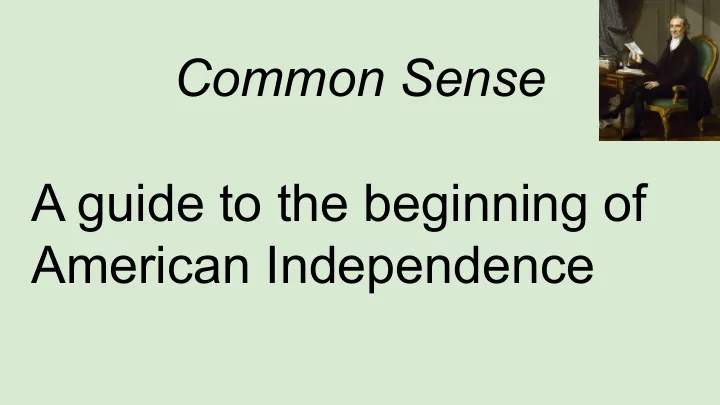

Common Sense A guide to the beginning of American Independence
List of Events Leading to the American Revolution ● French & Indian War - fought between Britain and France over land in the Ohio River Valley; both sides wanted the resources ● Treaty of Paris 1763 ● Proclamation of 1763 Series of taxes on various goods Smuggling Sons of Liberty -- coordinated action against the British
List of Events Leading to the American Revolution ● Sugar Act (1764) . This British law charged duties on sugar & molasses imported by the colonies. Several other products were also taxed. ● Currency Act (1751 and 1764) . Several Acts which regulated the issuing of money by the American colonist. ● Stamp Act (1765) . This British law required certain printed materials including newspapers in America be on paper produced in Britain and stamped with a revenue stamp. ● Quartering Act (1765) . This act forced the colonist to provide food and shelter for British soldiers when needed. ● Townshend Acts (1767) . A series of acts passed By Britain beginning in 1767 that taxed the colonies. ● Boston Massacre (1770) . An angry mob of colonist confronts British soldiers in Boston. Five colonists are killed. ● Tea Act (1773) . This act basically gave the British East India Company a monopoly on tea trade in the Americas. ● Boston Tea Party (1773) . In response to the Tea Act patriots dressed as American Indians dump British tea into Boston Harbor. ● Intolerable Acts (1774) . A series of laws also called the Coercive Acts passed by Britain in response to the Boston Tea Party.
Patriots vs. Loyalists 1. Patriot - (called Whigs) Americans who believed the colonies had the right to govern themselves; willing to fight Britain 2. Loyalist - (called Tories) colonists who felt a deep loyalty to Britain & King; horrified by the idea of taking up arms against Britain 3. Neutralist - had yet to support either side; by the time the revolution began, many had changed their minds and joined one side
Common Sense by Thomas Paine ● Englishmen; self educated; penniless ● Caught attention of Ben Franklin ● Pamphlet published in 1775-1776 ● Woke America up ● Reasons for Colonists to rebel against Britain ● Treasonous work because it contained a radical idea that the Colonists should declare independence ● Sold 120,000 copies in first 3 months ● 5 months after is was published, the 2nd Continental Congress met
Common Sense by Thomas Paine ● “Yo, you are an island:” An idea that an island nation in Europe can drive policy for a continent is crazy. ● We aren’t British anymore. We are now diversified. We are Americans now and we have begun to build a sense of identity. This is the first example American defining literature. ● “Yo, mama:” what kind of “mother” is Great Britain? Mother country is not doing its motherly duties. She raises you and then violates your natural rights (and no representation).
Common Sense by Thomas Paine ● “Bang bang:” getting caught up in European alliances; he argues to not sit at the drama table ● Distance - Britain is thousands of miles away; communication is a problem; time gap create pragmatic problems ● Idea of Puritan Heritage: we were to be a refuge from Europe and Catholic Church/Church of England; separate self from drama; leads us to idea to separate officially ● Best Interest: Colonialism never will have our best interest; London’s interests > Boston’s interests; need to rule ourselves; we need our own representation
Recommend
More recommend